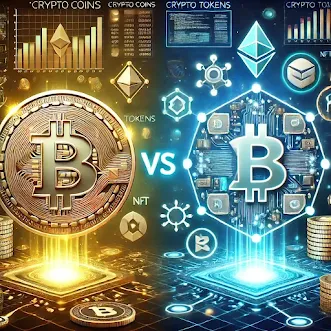Crypto Coins vs Crypto Tokens: What is the difference between the two?
Friends, the first thing that new people in the world of crypto get confused about is: What is the difference between Coin and Token? People put coins like Bitcoin, Ethereum and tokens like Shiba Inu, Dogecoin in the same category, but both are different things. Today we will explain this topic in Hinglish, so that you can know from basics to advanced: What is the real difference between Crypto Coin vs Token, how do they work, and what is their future.
1. What is Crypto Coin?
Crypto Coin is also called "Native Currency". These are those coins that run on their own blockchain. Like:
Bitcoin (BTC) – native currency of the Bitcoin blockchain.
Ethereum (ETH) – coin of the Ethereum blockchain.
Litecoin (LTC) – Litecoin has its own blockchain.
Key Features of Coins:
Independent Blockchain: There is a dedicated blockchain behind every coin. Like Bitcoin's blockchain is used only for BTC transactions.
Purpose: The main use of coins is to be "peer-to-peer payments" or "store of value". BTC is also called "Digital Gold".
Mining/Staking: Coins can be generated by mining or staking (through Proof of Work or Proof of Stake systems).
Example: If you buy something using Ethereum (ETH), then ETH is a coin, because it is part of the Ethereum blockchain.
2. What is a Crypto Token?
Tokens are created on existing blockchains. They do not have their own blockchain. Like:
Shiba Inu (SHIB) – ERC-20 token created on the Ethereum blockchain.
Chainlink (LINK) – This is also an Ethereum-based token.
Uniswap (UNI) – Runs on the Ethereum blockchain.
Key Features of Tokens:
No Own Blockchain: Tokens use other platforms (like Ethereum, Binance Smart Chain).
Utility-Based: Tokens are used only within a specific platform. For example, the UNI token is used for governance and fees on the Uniswap exchange.
Easy to Create: Tokens are easier to create than coins. Any developer can create their own token on platforms like Ethereum.
Example: If you buy virtual land using the Decentraland (MANA) token, then MANA is a token as it is built on the Ethereum blockchain.
3. Coins vs Tokens: Head-to-Head Comparison
Parameter Coins Tokens
Blockchain Your blockchain (e.g., BTC) Second blockchain (e.g., ETH)
Purpose Currency, Store of Value Platform-specific utilities
Creation Mining/Staking Smart Contracts
Examples BTC, ETH, LTC SHIB, UNI, LINK
Complexity Make it complex Make it easy
4. Coins and Tokens Use Cases
Crypto Coins Use Cases:
Digital Cash: You can make global payments using Bitcoin.
Investment: People treat coins like "digital gold" by holding them for a long term.
Blockchain Fees: You need ETH coins to run apps on Ethereum (gas fees).
Use Cases of Crypto Tokens:
DeFi (Decentralized Finance): Tokens like Aave (AAVE) are used in lending/borrowing platforms.
NFTs: NFTs like Bored Ape Yacht Club are also tokens (ERC-721 standard).
Governance: Tokens provide voting rights in DAOs (Decentralized Autonomous Organizations)
5. Pros & Cons of Coins and Tokens
Pros of Coins:
More Secure: Coins are more secure due to having their own blockchain.
Widely Accepted: Every exchange and wallet supports coins like BTC, ETH.
Stability: Coins are generally more stable than tokens (have a higher market cap).
Cons of Coins:
Slow Innovation: Upgrading a coin's blockchain is difficult (e.g., Bitcoin hard forks).
High Cost: Mining coins requires expensive hardware and energy.
Pros of Tokens:
Flexibility: Tokens can be customized for any use case (e.g., gaming, rewards).
Low Cost: Creating tokens on existing blockchain is cheap and fast.
Innovation: Trends like DeFi, NFTs, Metaverse are possible only through tokens.
Cons of Tokens:
Dependency: Tokens depend on their blockchain. If Ethereum goes down, all ERC-20 tokens will be affected.
Scams: Tokens are easy to create, so the risk of fake projects and rug pulls is high.
6. How to know if something is a coin or a token?
Check Blockchain: Go and check on CoinMarketCap or CoinGecko. If the asset is on Ethereum, BSC, etc., then it is a token.
Read Whitepaper: The whitepaper of coins contains details of their blockchain. Tokens refer to the parent blockchain.
Use Case: If the use case of the project is limited to a specific platform (like Crypto.com's CRO token), then it is a token.
7. What will happen in the future? Coins vs Tokens
Coins will remain relevant as long as blockchain technology exists. Coins like Bitcoin and Ethereum will be treated as "blue-chip" crypto.
The future of tokens is more connected with DeFi, NFTs, and Web3. The more apps are made, the more the demand for tokens will increase.
Expert Opinion:
Vitalik Buterin (Ethereum Founder) says that tokens increase the utility of the blockchain, but coins will always remain the base layer.
According to Michael Saylor (MicroStrategy), only coins (BTC) are safe for long-term investment.
8. FAQ: Most Common Question
Q1. Is Bitcoin a coin or token?
Ans: Bitcoin is a coin, because it has its own blockchain.
Q2. Is Dogecoin a coin or token?
Ans: Dogecoin is a coin, because it has its own blockchain (it was forked from Litecoin).
Q3. Are Stablecoins (USDT, USDC) coins or tokens?
Ans: These are tokens, because they are built on blockchains like Ethereum, Tron.
Conclusion: What is better for you?
If you want long-term investment or digital cash, then choose coins (BTC, ETH).
If you want to interact with DeFi trading, NFTs, or any platform, then tokens are a better option.
Friends, both coins and tokens have their own role in the crypto world. Invest wisely, not in FOMO. And remember: "Not your keys, not your crypto!"



.jpeg)

0 Comments